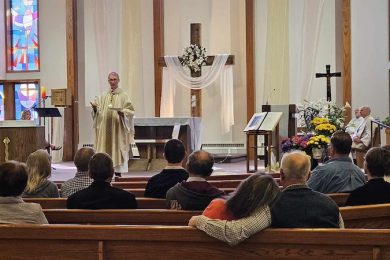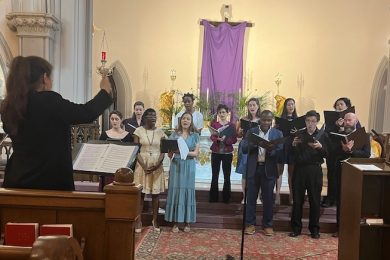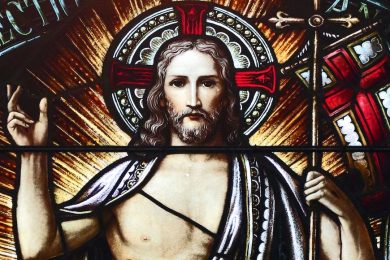Bishop Frank Caggiano of Bridgeport, Connecticut, issued a challenge to the more than 800 people who gathered for Diocesan Ministry Day: to dedicate themselves to the work of missionary discipleship.
In his keynote address Sept. 25 at the River’s Edge Convention Center in St. Cloud, the bishop said missionary discipleship can be known in three steps:
First, he said, Blessed Paul VI defines evangelization as “the invitation to encounter, know and love Jesus Christ in his fullness, his life, his death, his teaching, his resurrection, his ascension and his continuing presence in the world.
“And the way people experience that encounter is to fall in love with Jesus, to desire to know him. Not to follow the rules and regulations of the church because they are an exercise of authority, but because the Lord is asking it.”

Second, he said St. John Paul II reminded the church that the process of evangelization is different in every age. “In the contemporary world, there is a need for it to be reborn, or as he called it, a ‘new evangelization.’ St. Thomas Aquinas talks about three paths to God: truth, beauty and goodness. The newness for us is figuring out how to engage young people in all three.”
Bishop Caggiano said beauty can be found in literature, art, music and cultural expression. Truth can be proclaimed through intellectual engagement, asking questions and not being afraid to hear their questions. Goodness, he said, can be achieved through works of service and a life of virtue.
“All of these are different paths that can lead people to an encounter with Jesus Christ,” he said.
Third, Bishop Caggiano said Pope Francis provides a living example of how to accompany people as missionary disciples.
“The task is to witness who we are to people one person at a time. It’s to live the mandate of the Gospel to go out, preach and teach all nations and baptize them.
“You and I as missionary disciples first have to remember what the mission is,” he said. “Like St. Teresa said, our mission is to be the hands, the feet, the heart and voice of the Lord Jesus in the world. It is to bring to another what is held inside of our hearts, spirits, minds and communities. It is to be the bridge for the love of God to every person we meet.”
No time to waste
Bishop Caggiano said there is a sense of urgency to the work Pope Francis is calling for.
“We have all heard the phrase, ‘I am spiritual but I am not religious.’ That summarizes the great phenomenon of disaffiliation — the conscious or implicit decision that my search for God has nothing to do with you and nothing to do with the community you represent. I translate it to mean, spiritual is ‘me,’ religious is ‘we.’ A growing number of people young and old are saying. ‘I do not need a ‘we’ to find God.”
He added that studies have shown that disaffiliation begins as early as age 7 and by age 13, many children have made a decision about their faith.
“They do not find our communities to be credible, to be compelling, to be nurturing enough to allow them to stay while they struggle with the personal questions of their lives,” he said.
The second factor of urgency he noted is the rapid change in technology, which he said can be both an opportunity and a challenge.
“For young people, who are formed by technology, it is a qualitative part of their lives,” he said.
“Technology is a lion to be tamed so it can become an opportunity for evangelization. If we are blind to that, we will not be effective. Technology is moving on and it will not wait for us to figure out how to tame it in service to the Gospel.”
Bishop Caggiano offered his listeners some practical advice:
- “Every community must go through its own renewal. You cannot invite people into a parish that is dead.”
- “Remember that discipleship is not a spectator sport. It is no longer sufficient to say, ‘I fulfilled my Catholic obligation because I go to Mass on Sunday.’ Those days are over. Sunday Mass is only the beginning, not the end.”
- “Every person needs to join hands in doing this work because if we are going to accompany people one person at a time, every person should be accompanying someone.”
- “Let the young church help by leading us forward. They are eager, generous and want to be challenged. Let us follow their lead so they can become missionary disciples in electronic and virtual worlds, where in the coming years, there will be more people than in the pews.”
- “Your task and mine as missionary disciples is to come to know and love our sisters and brothers so deeply that we can help them to discern their path and walk with them until they can walk with someone else. And by doing that we will create the army that will bring the church to renewal.”
Slate of learning opportunities
In addition to the keynote address, Bishop Caggiano presented a learning session (see “Nine Cardinal Rules,”).
Participants chose from 12 learning sessions and six core sessions which included a variety of workshops such as pastoral planning (see story, next page); stories from Catholic Charities’ new executive director, Deacon Steve Pareja; a session with Dr. Joseph White on keeping children’s attention; and a look at God’s presence in the “messes of motherhood” by Laura Fanucci.
Additional topics included instructional strategies, belonging, pornography, self-compassion, adverse childhood experiences, evangelization, social justice, sacramental record-keeping, the Rite of Christian Initiation for Adults, music programs and a panel on diversity.
The day also included prayer, vendor exhibits, lunch and Mass.





















